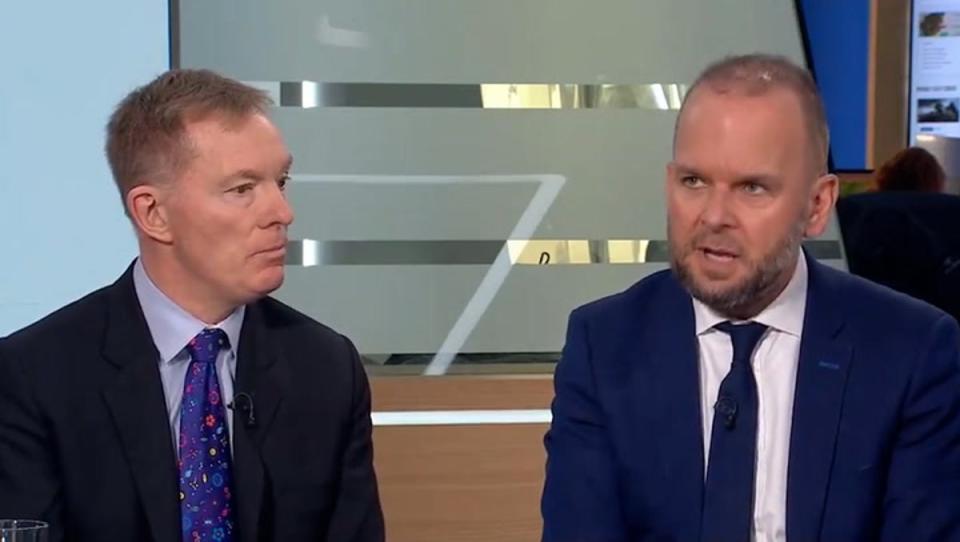Angela Rayner told kitchen renovations offset tax on council house sale
- Oops!Something went wrong.Please try again later.
Angela Rayner is expected to claim that she did not have to pay capital gains tax when she sold her former house due to a kitchen renovation, as the row over her housing affairs rumbles on.
The deputy Labour leader is likely to argue that enhancements she made to her former council house have offset the tax she would have paid had it not been her primary property, according to The Times.
It comes as the police are investigating “tax matters and other issues” in connection with Ms Rayner’s housing affairs, including whether she broke electoral law, whether she paid the correct amount of capital gains tax when she sold her property and what the council tax arrangements were at her former house.
The shadow levelling-up secretary is expected to provide a raft of legal and financial documents – which could include utility bills, payslips and bank account details – as evidence to show that her own home was her primary residence.
The probe into Ms Rayner’s tax affairs was launched after Conservative MP and deputy party chair James Daly complained after the Greater Manchester Police previously said it would not be investigating the allegations. Mr Daly said he had been made aware of neighbours contradicting Ms Rayner’s statement that her property, separate from her husband’s, was her main residence.

Ms Rayner has always maintained that her house was her primary residence, but it is now alleged that she will claim that she would not have been required to pay capital gains when she sold her former council house because of work she did to the property, leaving no tax liability.
A Labour source said: “Angela has consistently said that the house she owned was her main home and that no capital gains tax was payable on the sale. Various tax experts have already set out potential grounds for capital gains tax to not be applicable to the sale but it would not be appropriate to comment on baseless speculation while an investigation is ongoing.”
It comes as experts have warned that the tax affairs of Mark Rayner, the estranged husband of the Ashton-under-Lyne MP, may also come under scrutiny if it is shown that he also did not pay capital gains tax when he sold his property.
Experts have said that if Vicarage Road was her main residence and she did not pay capital gains tax on it, it would have automatically become her husband’s primary residence for tax purposes too.
Instead, the house her husband owned around a mile away on Lowndes Lane would have been subject to capital gains tax when it was sold. Married couples cannot legally have two primary residences for tax purposes.
Nimesh Shah, a tax expert at Blick Rothenberg, told The Telegraph newspaper: “Married couples are only permitted to claim private residence relief [on capital gains tax] on one property.
“If Mark Rayner has claimed PRR on Lowndes Lane in full, the Rayners have certainly had two bites of the cherry and it seems highly implausible, under the PRR rules and what we know, that that would have been possible.”
The shadow levelling-up secretary has promised to resign if she is found to have committed a crime but has stated that she is confident that she has done nothing wrong.
The Labour Party said it remains confident Ms Rayner has complied with the rules, and she “welcomes the chance to set out the facts with the police”.
Senior former Conservative figures have also defended the MP. Nick Boles, who was an MP for nine years, said the attacks were “one of the most grotesque spectacles of hypocrisy I have ever witnessed”, while former Conservative MP Matthew Parris condemned what he called “the hounding” of the Labour MP, dubbing it “outrageous: brutal, snobbish and completely out of proportion to any mistake she may (or may not) have made”.

Former regional chief crown prosecutor Nazir Afzal also said that “based on what’s in the public domain”, the CPS would take no action against Ms Rayner.
Sir Keir has previously welcomed the police investigation into Ms Rayner’s council house sale and said it will allow a “line to be drawn” on the issue.
A number of legal experts have pointed out that even if Ms Rayner were found to have provided false information, it is unlikely any further action would be taken.
Scott Wortley, a law lecturer at the University of Edinburgh, says that any potential prosecution should have been launched within a year of the suspected crime.
Providing false information is an offence under Section 13D of the Representation of the People Act 1983, but the legislation imposes a time limit of a year for bringing any charge. As the allegations surrounding Ms Rayner relate to before 2015, this suggests it is unlikely that she could be prosecuted.
Magistrates may extend that deadline in certain circumstances, but only by another year, according to the act.

